



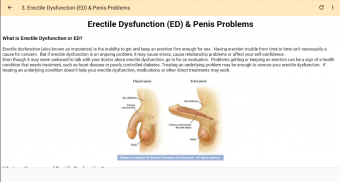
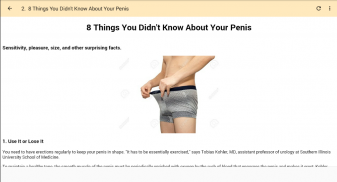
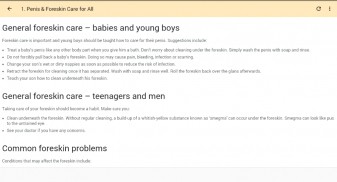
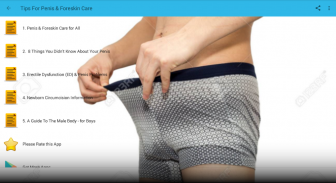
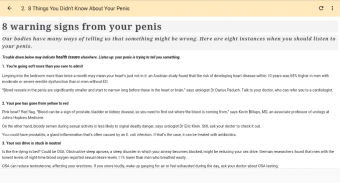
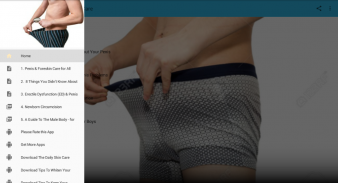
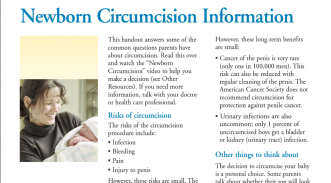
Penis & Foreskin Care - Tips To Keep It Healthy

Description de Penis & Foreskin Care - Tips To Keep It Healthy
Maintaining good hygiene and care of your genitals reduces the chances of developing problems like skin irritations and some common infections. Often it is assumed that men know the steps to good penis care, but it never hurts to remind yourself of the best practices. The same basic principles apply whether you have a foreskin or have been circumcised.
There are things you can do to look after yourself.
Penis health: Identify and prevent problems
Penis health involves more than erections. Find out the most common penis problems and strategies to promote penis health.
What is the penis?
Used for urination and sexual intercourse, the penis is made up of two erectile cylinders (corpora cavernosa) that enlarge with blood during erection. A tough fibrous, partially elastic outer casing surrounds the cavernosa. The corpus spongiosum surrounds the urethra (urinary tube), a tube that runs from the bladder to the end of the penis. The urethra carries urine and semen out of the body.
The head of the penis (glans penis) is covered by the foreskin in uncircumcised men.
The foreskin is the sheath of skin that covers the head (glans) of the penis. At birth, the foreskin is fully attached to the penis. In time, the foreskin separates and can be retracted (pulled back). This can usually be done by the age of about two. Sometimes, the foreskin separates later. Occasionally, the foreskin doesn’t separate evenly and areas remain stuck to the glans. These attachments almost always resolve by puberty.
Some of The Topics on this app are:
How to look after your penis' health
Why is penis health so important?
What can go wrong with my penis?
How do I know if there is something wrong with my penis?
General foreskin care – babies and young boys
General foreskin care – teenagers and men
Common foreskin problems
DIY penis maintenance
Maintaining an erection
Protect your penis from STIs
Use your penis to keep it healthy
How to clean your penis
Diagnosis of foreskin problems
Treatment of foreskin problems
Circumcision for older boys and men
What care of the foreskin and penis is needed in infants, children and teenagers?
How do I teach my son to wash his penis?
What happens if someone pulls back my son's foreskin too early?
What is the white lump (smegma) under my son's foreskin?
Why does my son's foreskin 'balloon' when he wees?
What if my son's foreskin can't be pulled back (phimosis)?
What causes my son's foreskin to be red (balanitis)?
What about circumcision?
Care Advice for Foreskin Care
also a few other things that can hurt your penis
8 warning signs from your penis
8 Things You Didn't Know About Your Penis
Visually inspecting your penis regularly to stay aware of any new symptoms or conditions that may occur is healthy and beneficial.
Disclaimer
This information should not replace discussion with your doctor or a healthcare professional. The RCH has made all reasonable efforts to ensure this information is accurate at the time of publishing. The RCH is not responsible for any mistakes, misunderstanding, or the success of any treatment outlined in these handouts. This information is updated regularly. Always check and make sure that you have the current version.
If you like this Application please consider leaving a positive review and/or rating for it in the store.
Do not hesitate to make your comment, suggestion, advice and so on via kzapps88@gmail.com
Maintenir une bonne hygiène et prendre soin de vos organes génitaux réduit les risques de développer des problèmes tels que des irritations de la peau et certaines infections courantes. On suppose souvent que les hommes connaissent les étapes à suivre pour bien prendre soin de leur pénis, mais il est toujours utile de se rappeler les meilleures pratiques. Les mêmes principes de base s’appliquent que vous ayez un prépuce ou que vous ayez été circoncis.
Il y a des choses que vous pouvez faire pour prendre soin de vous.
Santé du pénis: identifier et prévenir les problèmes
La santé du pénis implique plus que des érections. Découvrez les problèmes de pénis les plus courants et les stratégies pour promouvoir la santé du pénis.
Quel est le pénis?
Utilisé pour la miction et les rapports sexuels, le pénis est constitué de deux cylindres érectiles (corps caverneux) qui s’agrandissent de sang pendant l’érection. Une enveloppe externe fibreuse et partiellement élastique dure entoure le cavernosa. Le corps spongieux entoure l'urètre (tube urinaire), un tube qui va de la vessie à l'extrémité du pénis. L'urètre transporte l'urine et le sperme hors du corps.
La tête du pénis (gland penis) est recouverte par le prépuce chez les hommes non circoncis.
Le prépuce est la gaine de peau qui recouvre la tête (gland) du pénis. À la naissance, le prépuce est complètement attaché au pénis. Avec le temps, le prépuce se sépare et peut être rétracté. Cela peut généralement être fait vers l'âge de deux ans environ. Parfois, le prépuce se sépare plus tard. Parfois, le prépuce ne se sépare pas uniformément et des zones restent collées au gland. Ces attachements se résolvent presque toujours par la puberté.
Certains des sujets sur cette application sont:
Comment prendre soin de la santé de votre pénis
Pourquoi la santé du pénis est-elle si importante?
Qu'est-ce qui peut mal tourner avec mon pénis?
Comment savoir s'il y a un problème avec mon pénis?
Soins généraux du prépuce - bébés et jeunes garçons
Soins généraux du prépuce - adolescents et hommes
Problèmes de prépuce communs
Entretien du pénis de bricolage
Maintenir une érection
Protégez votre pénis des IST
Utilisez votre pénis pour le garder en bonne santé
Comment nettoyer votre pénis
Diagnostic des problèmes de prépuce
Traitement des problèmes de prépuce
Circoncision pour garçons et hommes plus âgés
Quels soins du prépuce et du pénis sont nécessaires chez les nourrissons, les enfants et les adolescents?
Comment puis-je apprendre à mon fils à laver son pénis?
Que se passe-t-il si quelqu'un retire le prépuce de mon fils trop tôt?
Quelle est la masse blanche (smegma) sous le prépuce de mon fils?
Pourquoi le «ballon» du prépuce de mon fils quand il pète?
Et si le prépuce de mon fils ne pouvait pas être retiré (phimosis)?
Qu'est-ce qui fait que le prépuce de mon fils est rouge (balanite)?
Qu'en est-il de la circoncision?
Conseils d'entretien pour les soins du prépuce
aussi quelques autres choses qui peuvent blesser votre pénis
8 signes d'alerte de votre pénis
8 choses que vous ne saviez pas sur votre pénis
Inspecter visuellement votre pénis régulièrement pour rester au courant des nouveaux symptômes ou conditions qui pourraient survenir est sain et bénéfique.
Avertissement
Ces informations ne doivent pas remplacer une discussion avec votre médecin ou un professionnel de la santé. Le RCH a fait tous les efforts raisonnables pour que ces informations soient exactes au moment de la publication. Le RCH n'est pas responsable des erreurs, des malentendus ou de la réussite des traitements décrits dans ces documents. Cette information est mise à jour régulièrement. Toujours vérifier et assurez-vous que vous avez la version actuelle.
Si vous aimez cette application, veuillez laisser une critique positive dans le magasin.
N'hésitez pas à faire vos commentaires, suggestions, conseils, etc. via kzapps88@gmail.com
Maintaining good hygiene and care of your genitals reduces the chances of developing problems like skin irritations and some common infections. Often it is assumed that men know the steps to good penis care, but it never hurts to remind yourself of the best practices. The same basic principles apply whether you have a foreskin or have been circumcised.
There are things you can do to look after yourself.
Penis health: Identify and prevent problems
Penis health involves more than erections. Find out the most common penis problems and strategies to promote penis health.
What is the penis?
Used for urination and sexual intercourse, the penis is made up of two erectile cylinders (corpora cavernosa) that enlarge with blood during erection. A tough fibrous, partially elastic outer casing surrounds the cavernosa. The corpus spongiosum surrounds the urethra (urinary tube), a tube that runs from the bladder to the end of the penis. The urethra carries urine and semen out of the body.
The head of the penis (glans penis) is covered by the foreskin in uncircumcised men.
The foreskin is the sheath of skin that covers the head (glans) of the penis. At birth, the foreskin is fully attached to the penis. In time, the foreskin separates and can be retracted (pulled back). This can usually be done by the age of about two. Sometimes, the foreskin separates later. Occasionally, the foreskin doesn’t separate evenly and areas remain stuck to the glans. These attachments almost always resolve by puberty.
Some of The Topics on this app are:
How to look after your penis' health
Why is penis health so important?
What can go wrong with my penis?
How do I know if there is something wrong with my penis?
General foreskin care – babies and young boys
General foreskin care – teenagers and men
Common foreskin problems
DIY penis maintenance
Maintaining an erection
Protect your penis from STIs
Use your penis to keep it healthy
How to clean your penis
Diagnosis of foreskin problems
Treatment of foreskin problems
Circumcision for older boys and men
What care of the foreskin and penis is needed in infants, children and teenagers?
How do I teach my son to wash his penis?
What happens if someone pulls back my son's foreskin too early?
What is the white lump (smegma) under my son's foreskin?
Why does my son's foreskin 'balloon' when he wees?
What if my son's foreskin can't be pulled back (phimosis)?
What causes my son's foreskin to be red (balanitis)?
What about circumcision?
Care Advice for Foreskin Care
also a few other things that can hurt your penis
8 warning signs from your penis
8 Things You Didn't Know About Your Penis
Visually inspecting your penis regularly to stay aware of any new symptoms or conditions that may occur is healthy and beneficial.
Disclaimer
This information should not replace discussion with your doctor or a healthcare professional. The RCH has made all reasonable efforts to ensure this information is accurate at the time of publishing. The RCH is not responsible for any mistakes, misunderstanding, or the success of any treatment outlined in these handouts. This information is updated regularly. Always check and make sure that you have the current version.
If you like this Application please consider leaving a positive review and/or rating for it in the store.
Do not hesitate to make your comment, suggestion, advice and so on via kzapps88@gmail.com
























